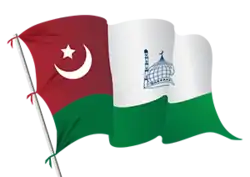Samastha Kerala Jamiat-ul-Ulema
Samastha Kerala Jamiat-ul-Ulema (the Samastha[6], pronounced Samasta Kerala Jam'iyyat al-'Ulama') is the principal Sunni-Shafi'i scholarly body in Kerala.[7][1][8] It was organised in the aftermath of the 1921 Mappila Uprising as a response to the growing Salafi movement in Kerala.[7][1] The body witnessed an organisational division[8] during the late 1980s, with a set of scholars forming a new group (the Kanthapuram or the A. P. Sunni[3][1]). The factional group is now known as E. K. or the Samastha Sunni.[1][7][9][3]
Samasta Kerala Jam'iyyat al-'Ulama' | |
 Samastha Kerala Jamiat-ul-Ulema (E. K. or Official[1]) (flag) | |
| Nickname | Samastha[1] |
|---|---|
| Formation | 1926[1] |
| Founders | |
| Founded at | Kozhikode |
| Type | Scholarly body[1] |
| Legal status | Registered in India as per Society Registration Act |
| Headquarters | Chelari (south of Kozhikode)[4] |
Region | Kerala |
Founding President | Varakkal Mullakkoya Tangal[2] |
Founding Vice Presidents[2] |
|
Founding Secretaries[2] |
|
| Subsidiaries |
|
| Part of a series on |
| Islam |
|---|
 |
|
Samastha Kerala Jamiat-ul-Ulema is headquartered at Chelari, near the University of Calicut.[6] Sayed Jifri Muthukkoya Thangal is the current President of the Samastha.[10] K. Ali Kutty Musliyar is the current General Secretary of the Samastha Kerala Jamiat-ul-Ulema[11]
A forty-member 'mushawara' is the high command body of both Sunni groups.[4][12] The administration of Islamic education in Kerala is not managed by Government of Kerala.[8] The two Sunni bodies run thousands of mosques, madrasas (institutions where children receive basic Islamic education) and Arabic Colleges (the equivalent of north Indian madrasas). They run regular Malayalam and English medium arts-and-science and technology ("professional") colleges also.[7]
Ordinary Sunnis of Kerala are largely identified with either the "E. K." or the "A. P." group.[13] The Samastha (E. K.) is often described as 'a grouping, and not a cadre-based organisation'.[12]
History
Early years
Samastha Kerala Jamiat-ul-Ulema, or the Samastha, was organised in 1926 as a response to the growing Salafi movement in Kerala.[7][1][14]
A nascent form of the Ulema was formed in Kozhikode in 1925.[2] This was organised by Maulana Pangil Ahmad Kutti Musliyar and Varakkal Ba Alavi Mullakkoya Tangal with K. P. Muhammad Miran Musliyar as the President and Parol Husain Maulavi as the Secretary.[2] The Ulema was formally constituited on 26 June 1926 at Town Hall, Kozhikode.[2]
| Structure of the Ulema (1926) | |
|---|---|
| President[2] | Varakkal Mullakkoya Tangal |
| Vice Presidents[2] | Pangil Ahmad Kutti Musliyar |
| Abulhaq Muhammad Abdul Bari Musliyar | |
| K. M. Abdul Qadir Musliyar, Pallippuram | |
| K. P. Muhammad Miran Musliyar | |
| Secretaries[2] | P. V. (Palli Veettil) Muhammad Musliyar |
| P. K. Muhammad Musliyar | |
Timeline
- 1925 — a nascent form of the Ulema formed at Valiya Juma Masjid, Kozhikode.[2]
- 1926 June 26 — S. K. J. U. formed at Kozhikode Town Hall in the presence of Sayyid Shihabuddin Cherukunjikkoya Thangal[2]
- 1927 Feb 7 — First conference at Tanur in the presence of Liyauddeen Hazrath (Nalir Bakhiyath)
- 1929 Dec — S. K. J. U. published its first periodical al-Bayan.[14]
- 1932 June — Pangil Ahmad Kutti Musliyar appointed as the President of S. K. J. U. (succeeding Varakkal Mullakkoya Tangal)
- 1934 Nov 14 — S. K. J. U. officially registered by law at Kozhikode district registrar office.
- 1951 March 24 — Paravanna Mohiyadheen Kutty Musliyar appointed as S. K. J. U. General Secretary
- 1951 Sep 17 — Samastha Kerala Islam Matha Vidhyabhyasa Board (S. K. I. M. V. B) formed
- 1954 April 26 — S. K. J. U. formed a youth wing under its fold "Samastha Kerala Sunni Yuvajana Samgham (SYS)"
- 1965 — Jamia Nooriyya Arabiyya established at Pattikkad (near Perintalmanna).[9]
- 1978 — Kanthapuram A. P. Aboobacker Musliyar forms Jamia Markazu Saquafathi Sunniyya at Karanthur, near Kozhikode.[15]
- 1989 — Organisational division.[8]
Educational activities
Madrasa in Kerala refers to institution where children receive basic Arabic language and Islamic instruction.[7] As of 2008, the Samastha run over 10,000 Kerala madrasas with around one million students (the Salafi movement-oriented groups run around 500 Kerala madrasas).[7] Around 72,000 teachers are registered with these madrasas.[7] The Samastha also run a chain of Arabic Colleges in Kerala (equivalent of north Indian madrasas).[7]
Both the Sunni organisations are running regular Malayalam and English medium arts-and-science and technology ("professional") colleges also.[7] Both groups run educational institutions outside the Kerala state too.[12]
Publications
The Samastha is known for publishing a short-lived Malayalam monthly magazine in the late 1920s.[14] The periodical — known as al-Bayan — was first printed in 1929 (Arabic-Malayalam script).[14] The magazine reinvented itself in Malayalam Script for a short period in the 1950s.[14]
A. P. and E. K. groups
The two 'traditional' Sunni groups are named after the initials of leading scholars of each group.[8] Both of them were the leading scholars of Samastha Kerala Jamiat-ul-Ulema, until they were divided in 1989 over some political (such as the support to the Indian Union Muslim League and approach towards the Salafi movement), organizational and legalistic issues.[8][12]
Led by A. P. Aboobacker Musliyar ten members separated themselves from the 40-member mushawara in 1989, forming a parallel organisation. The scholars claimed their organisation is the 'original' Samastha.[12]
- The E. K. group is named after E. K. Aboobacker Musliyar.[8]
- The A. P. group is named after A. P. Aboobacker Musliyar.[8]
The E. K. group, in general, is politically aligned with the Indian Union Muslim League (a major member of the United Democratic Front) while the A. P. group generally supports the none of the parties.[16][17] The A. P. group has also tilted and shifted its political support several times in the past.[18]
Leadership

Presidents
- Varakkal Mullakkoya Thangal (1924—1933)
- Pangil Ahmad Kutti Musliyar (1933—1945)
- Valakkulam Abdul Bari Musliyar (1945—1965)
- K K Sadakkathullah Musliyar (1965—1967)
- Kanniyath Ahmed Musliyar (1967—1993)
- K K Aboobacker Hazrath(1993-1995)
- Sayyid Abdurrahman Imbichikkoya Thangal Al Azhari (1995-2004)
- Kalambadi Muhammad Musliyar
- Anakkara Koyakutty Musliyar
- Kumaramputhur A.P. Muhammed Musliyar
- Sayyid Muhammad Jifri Muthukkoya Thangal(2017—present)
General Secretaries
- P. V. Muhammed Musliyar (1924—1951)
- Paravanna Mohiyadheen Kutty Musliyar (1951—1957)
- E. K. Aboobacker Musliyar[14] (1957—1996)
- Cherussery Zainuddeen Musliyar (1996-2016)
- K. Ali Kutty Musliyar( 2016 —present)
Current Sunni bodies
| Name of the Sunni group[8] | E. K. Samastha (or)
Samastha Sunni (or) Samastha-Chelari |
Sources | Kanthapuram (or)
A. P. group or AP SAMASTHA |
Sources | |
|---|---|---|---|---|---|
| Scholarly body
(the Jamiat-ul-Ulema) |
Samastha Kerala Jamiat-ul-Ulema[8] | Website | All India Sunni Jamiat-ul-Ulema
(or) Samastha Kerala Sunni Jamiat-ul-Ulema (or) Kerala Muslim Jama'at |
[8][20][21] | |
| Leader | Sayed Jifri Muthukkoya Thangal | [19] | Kanthapuram A. P. Aboobacker Musliyar | [19] | |
| Office Bearers | President | Sayed Jifri Muthukkoya Thangal | [22] | E. Sulaiman Musliyar | [23] |
| General Secretary | K. Alikkutti Musliyar | [10] | Kanthapuram A. P. Aboobacker Musliyar | [24] | |
| Mahallu Federation | Samastha Kerala Sunni Mahallu Federation
(S. M. F.) |
Website | |||
| Educational board | Samastha Kerala Islam Matha Vidhyabhyasa Board
(S. K. I. M. V. B.) |
[25][26] | Samastha Kerala Sunni Vidhyabhyasa Board | [25]Website | |
| Madrasa teacher's Association | Samastha Kerala Jamiat-ul Muallimeen | Website | Sunni Jamiat-ul Muallimeen | Website | |
| Youth wing | Sunni Yuvajana Sangham (S. Y. S.) | Sunni Yuvajana Sangham (S. Y. S.) | [27][20] | ||
| Student wing | Samastha Kerala Sunni Students' Federation | [28]Website | Sunni Students' Federation (S. S. F.) | [20][29]Website | |
| Children's wing | Samastha Kerala Sunni Balavedhi
(S. B. V.) |
Website | Sunni Bala Sangham | ||
| Mouthpiece (daily) | Suprabhatham | [30]Website | Siraj | [30]Website | |
References
- "Muslim League in Kerala". Economic and Political Weekly. 55 (7): 7–8. 5 June 2015.
- "Karma Bhumiyil (Malayalam)". Samastha Kerala Islam Matha Vidhyabyasa Board (official website). 5 August 2013. Archived from the original on 5 August 2013. Retrieved 2 June 2020.
- "Sunni factional feud takes a violent turn - The Hindu". 29 May 2020. Archived from the original on 29 May 2020. Retrieved 29 May 2020.
- Naha, Abdul Latheef (18 January 2018). "Sunni factions to bury the hatchet". The Hindu. ISSN 0971-751X. Retrieved 23 August 2019.
- {{Cite web|url=https://www.thehindu.com/news/national/kerala/massive-rally-marks-skssf-meet/article6923871.ece
- Naha, Abdul Latheef (3 January 2018). "No action against Panakkad scions". The Hindu. Malappuram. Archived from the original on 6 June 2020. Retrieved 6 June 2020.
- OSELLA, FILIPPO, and CAROLINE OSELLA. "Islamism and Social Reform in Kerala, South India." Modern Asian Studies, vol. 42, no. 2-3, 2008, pp. 317–346., doi:10.1017/S0026749X07003198.
- Kooria, Mahmood (1 June 2018). "Uses and Abuses of the Past: An Ethno-History of Islamic Legal Texts". Oxford Journal of Law and Religion. 7 (2): 313–338. doi:10.1093/ojlr/rwy034. ISSN 2047-0770.
- Miller, Roland. E., "Mappila" in "The Encyclopedia of Islam". Volume VI. E. J. Brill, Leiden. 1987 pp. 458-56.
- Web Desk (3 June 2020). "Aradhanalayangal Turakkanam; Samasta". MediaOne News. Kerala. Retrieved 4 June 2020.
- {{Cite web|title=https://www.mathrubhumi.com/print-edition/kerala/action-against-the-sys-leader-alikutty-musliyar-1.5373880
- Alingal, Shafeeq (7 January 2018). "Kerala: League of factions". The New Indian Express. Malappuram. Archived from the original on 11 June 2020.
- "In Kerala's old Sunni vs Sunni rivalry, a new daily". The Indian Express. 1 September 2014. Retrieved 1 June 2020.
- Miller, Roland E. (27 April 2015). Mappila Muslim Culture: How a Historic Muslim Community in India Has Blended Tradition and Modernity. SUNY Press. pp. 101–103 and 330. ISBN 978-1-4384-5601-0.
- Miller, Roland E. (2015). Mappila Muslim Culture: How a Historic Muslim Community in India Has Blended Tradition and Modernity. Albany, NY: SUNY Press. p. 214.
- Ameerudheen, T. A. "Big deal: Merger of two factions of a Muslim group could realign political forces in Kerala". Scroll.in. Retrieved 1 June 2020.
- "In Kerala's old Sunni vs Sunni rivalry, a new daily". The Indian Express. 1 September 2014. Retrieved 1 June 2020.
- Naha, Abdul Latheef (25 March 2014). "Muslim votes not a monolithic bloc". The Hindu. Malappuram. Archived from the original on 6 June 2020. Retrieved 6 June 2020.
- Naha, Abdul Latheef (12 December 2018). "Factions push hard for Sunni unity". The Hindu. ISSN 0971-751X. Retrieved 6 June 2020.
- Kumar, Ashwani. "Fight terror with education". Khaleej Times. Retrieved 2 June 2020.
- "'Born in India, will die in India': Kerala Muslims declare at an anti-CAA protest in Kochi". Malayalam Manorama. Retrieved 2 June 2020.
- "Muhammad Jifri Muttukkoya Tangal Samasta President". Malayalam Manorama. Kozhikode. 23 January 2017. Retrieved 17 August 2019.
- Staff Reporter (22 May 2019). "Madin Academy to host Ramzan gathering". The Hindu. ISSN 0971-751X. Retrieved 23 August 2019.
- "Born in India, will die in India: Kerala Muslims declare at an anti-CAA protest in Kochi". Malayalam Manorama. Kochi. 2 January 2020. Archived from the original on 5 June 2020. Retrieved 5 June 2020.
- 4 Dec, K. R. Rajeev | TNN | Updated; 2015; Ist, 14:58. "Winds of change as women ace madrassa exams | Kozhikode News - Times of India". The Times of India. Retrieved 23 August 2019.CS1 maint: numeric names: authors list (link)
- "Samasta Potu Parisha Matti Veccu". Madhyamam. Chelari. 18 May 2020. Retrieved 4 June 2020.
- Naha, Abdul Latheef (25 July 2018). "Sunnis chalking out campaign against SDPI". The Hindu. Kerala. Archived from the original on 6 June 2020. Retrieved 6 June 2020.
- "Widespread protests against CAA in Kozhikode - The Hindu". The Hindu. 4 June 2020. Archived from the original on 4 June 2020. Retrieved 4 June 2020.
- "Sunni Students' Federation to target Salafis, Jamaat-e-Islami on Islamic State". Deccan Chronicle. 4 June 2020. Archived from the original on 4 June 2020. Retrieved 4 June 2020.
- Philip, Shaju (1 September 2014). "In Kerala's old Sunni vs Sunni rivalry, a new daily". The Indian Express. Thiruvananthapuram. Retrieved 4 June 2020.